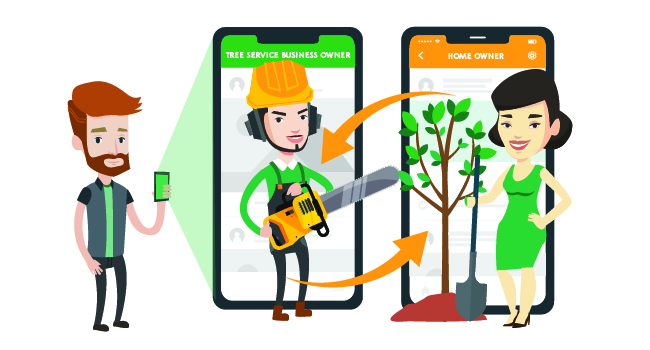If you’re a tree service provider, then you know that generating leads is essential to your success. But should you focus on shared or exclusive leads? Which option offers the best ROI? In this blog post, we’ll explore the pros and cons of each approach and help you decide which route is best for your business.
What Are The Differences Between Exclusive and Shared Tree Leads?
If your tree service business that purchases leads for your company and generates customers, you have probably come across the term “lead generation”. Simply defined, the term “lead generation” refers to the process of creating phone calls for tree service estimates.
There are numerous ways to create these opportunities – including, advertising, tree service marketing, and buying leads. Buying leads, however, is popular for one simple reason – it reduces and, in some cases, eliminates, the work a tree service company needs to do to generate leads.
When buying leads, all the work is left to a lead generation company that handles everything from tree service SEO (Search Engine Optimization) and ads to landing page optimization. A good lead generation company – for example, Home Service Direct – allows tree service providers to cast wider nets into a sea of high-quality and promising leads.
When working with lead generation companies, one thing you need to understand is that all tree service leads are not created equal. Understanding the different types of tree service leads available is the key to acquiring a stream of customers looking to pay for your tree services.
In the tree service industry, two types of leads are extremely common – these are shared and exclusive leads. The goal of this detailed guide is to help you better understand these two types of leads.
What Are Shared Leads?
This is the most commonly sold type of tree service lead. When purchasing a shared tree service lead, it means that you are getting a lead that will be sold to other tree service providers.
With shared leads, you have to compete with other companies to turn the lead into a paying customer. Competition, therefore, is one of the biggest hurdles of shared leads.
Customers are generally focused on getting tree services and do not understand how lead generation companies operate. This means that it may be overwhelming for a customer when he/she receives calls from multiple tree service providers.
Another complaint associated with shared leads is that they are often low in quality. This, however, is not to say companies that sell shared leads are employing fraudulence in their practices. However, it is generally hard for lead generation companies to track down sources of low-quality leads when they are shared.
Because of their nature, shared leads are often cheaper than exclusive leads. The lower cost of shared leads often allows tree service providers to purchase a bigger volume of leads.
Shared leads often benefit tree service providers with optimal sales processes and a strong brand. With a higher brand awareness – and the ability to quickly follow up on each shared tree service lead – these companies can convert more shared leads into customers.
The Pros of Shared Leads
- Compared to exclusive leads, shared leads are more affordable (cheaper).
- Shared leads are also available in bigger volumes.
The Cons of Shared Leads
- Tree service companies without an optimal sales process find it hard to convert shared tree service leads into paying customers. Not reaching out to the shared lead immediately often gives other tree service providers a chance to call and presents themselves as the best company.
- You may get low-quality leads.
What Are Exclusive Leads?
Exclusive leads eliminate the competition factor. An exclusive tree service lead is only sent to one contractor. Since leads are opportunities for jobs, exclusive leads increase the chances of landing the job.
Much like with shared leads, there is a chance that potential customers do not understand that the lead generation process was handled by a different company and the tree care procedure will be handled by a different company.
However, with exclusive leads, the tree care company can easily explain the process and then offer their services since they are the only company contacting the customer. However, it is worth noting that even exclusive leads do not always guarantee that you will get the job. But, since you are not competing with other tree service companies, you will have more control over the sales process.
The quality of exclusive tree service leads is usually higher than that of shared leads. This is because lead generation companies have an easier time identifying bad calls and then tracking them back to the source.
This gives the lead generation companies a chance to eliminate low-quality ad placements and adjust – or eliminate – advertising methods that are performing poorly. With exclusive leads, the lead generation company may also have a process that allows tree service providers to bring low-quality tree service leads to their attention.
Depending on your lead generation company, exclusive leads might be costlier than shared leads. However, the higher cost may be worth paying since you are not competing with other companies for the opportunity.
Pros of Exclusive Leads
- The overall quality of exclusive leads is higher.
- Exclusive leads perform extremely well for companies with less optimal sales processes.
- Exclusive leads eliminate the competition that comes with shared leads.
Cons of Exclusive Leads
- The cost per tree service lead may be higher.
- The lead volume may be lower.
Choosing Between Exclusive and Shared Tree Service Leads: Which One is Right for You?
To choose between exclusive vs shared leads, you may need to consider the following factors:
1. Your Budget
As noted earlier, shared leads tend to be cheaper than exclusive leads. For this reason, if your tree service business is currently low on funds or operating under a tight budget, shared leads may be a better option.
2. Your Brand Awareness
If your tree service company is relatively new, there is a chance that most customers haven’t heard about it. If you choose shared leads and compete with companies with bigger brand awareness, the chances of not converting shared leads into customers will be very high. For this reason, if your company is still growing its brand awareness, exclusive leads may be a better option.
3. Sale Process
Shared leads generally benefit companies with an optimal sales process. A company with an optimal sales process can reach out to a tree service lead before a competitor does. This places the company high on the customer’s list of choices – this increases the chances of turning the lead into a paying customer.
If your company’s sales process has not reached an optimum level, you may want to stick with exclusive leads. Since exclusive leads are only sent to one company, you won’t have to worry about competition.
4. Return on Investment
While shared leads may be cheaper, their return on investment might be low. For example, if you pay for 10 leads and only manage to turn 1 into a paying customer, you may find the money you are making from the leads is much lower than the amount you are spending to get those leads.
While exclusive leads may be more expensive than the shared leads, in all likelihood, they may provide higher profit margins for your tree service business.
5. Volume vs. Quality
While shared leads may be low-quality, they are often in bigger volumes. While exclusive leads may be high-quality, their volume is usually low.
If you often find bigger lead volume works better for your company, shared leads may be the way to go. However, if the lead quality is an important factor in your business, you may want to invest in exclusive leads.








